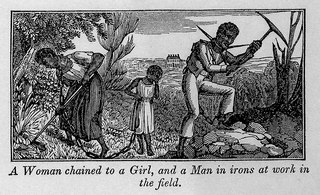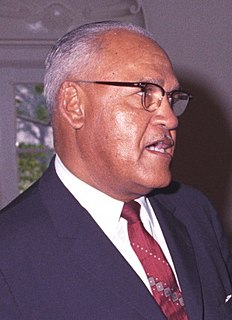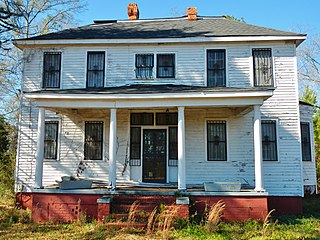External links
- The Future of the American Negro at Project Gutenberg
 The Future of the American Negro public domain audiobook at LibriVox
The Future of the American Negro public domain audiobook at LibriVox
| Life | |
|---|---|
| Books |
|
| Honors | |
| Related |
|
The Future of the American Negro, a book written in 1899 by American educator Booker T. Washington, set forth his ideas regarding the history of enslaved and freed African-American people and their need for education to advance themselves. It was re-published as a second edition in 1900 and was made available in electronic form in 2008 via Project Gutenberg. [1]
In the beginning of the book, the author mentions the term "industrial education". Washington describes this term as meaning, learning the necessities to become a valuable member of society as well and being able to apply this knowledge to industrial business. He believes that even though slavery is illegal, the freed African-Americans are still enslaved to the white people. Those who are freed cannot be members of society because they are not given the same opportunities.
As the book continues, Booker T. Washington writes that in order to understand the stress he applies to industrial education, the reader must "review the condition of affairs at the present time in the Southern States." He provides the information that the North and South are linked even though they were once at war. If the North cannot provide education then the South will not provide it.
Washington also states that the African-Americans are not superior, but that they are definitely not inferior to the white people. Slaves have had a hard time throughout their life in the United States. Their strength, knowledge, and perseverance has been tested by the white people that have run their lives for the longest time. Booker T. Washington asks, why should African-Americans have to prove themselves over and over when they have been proving themselves since they entered the country? The author also reminds them that, "An individual cannot succeed unless that individual has a great amount of faith himself."
African-Americans can have all the faith they want, but Washington argues that knowledge is needed to become useful members of society. Blacks have worked hard but will have to understand what they are working for.
Throughout the book, Washington refers to Tuskegee, a university founded by himself and others. It was a historically black university in Tuskegee, Alabama. In The Future of an American Negro, Booker writes that the university is, "placing men and women of intelligence, religion, modesty, conscience, and skill in every community in the South." Washington believes that Tuskegee University is providing the South with valuable members of society. In "Chapter V", there is a reference to a study showing that some 3,000 graduates or students are doing "commendable" work in the Southern community.
Near the end of the book, Washington describes the difference for freed slaves in the North and South. He reminds the reader that North has fewer employment option for black people which perpetuates the stress on the morals of an African-American. The South, however, having more opportunities for work and less stress on trying to do the right thing. He goes on to end the book with five principles that will aid African-Americans in their fight to have truly equal rights and opportunities. He states that these principle will be essential by saying, "So long as the Negro is permitted to get education, acquire property, and secure employment, and is treated with respect in the business or commercials world, … I shall have the greatest faith in his working out his own destiny in the Southern States."

Booker Taliaferro Washington was an American educator, author, orator, and adviser to several presidents of the United States. Between 1890 and 1915, Washington was the dominant leader in the African-American community and of the contemporary black elite. Washington was from the last generation of black American leaders born into slavery and became the leading voice of the former slaves and their descendants. They were newly oppressed in the South by disenfranchisement and the Jim Crow discriminatory laws enacted in the post-Reconstruction Southern states in the late 19th and early 20th centuries.

Tuskegee University is a private, historically black land-grant university in Tuskegee, Alabama. The campus is designated as the Tuskegee Institute National Historic Site by the National Park Service. The university was home to scientist George Washington Carver and to World War II's Tuskegee Airmen.

African-American history began with the arrival of Africans to North America in the 16th and 17th centuries. Former Spanish slaves who had been freed by Francis Drake arrived aboard the Golden Hind at New Albion in California in 1579. The European colonization of the Americas, and the resulting transatlantic slave trade, led to a large-scale transportation of enslaved Africans across the Atlantic; of the roughly 10–12 million Africans which were sold by The Barbary Slave trade, to European slavers into slavery or servitude in the Americas, approximately 388,000 landed in North America. After arriving in various European colonies in North America, the enslaved Africans were sold to white colonists, primarily to work on cash crop plantations. A group of enslaved Africans arrived in the English colony of Virginia in 1619, marking the beginning of slavery in the colonial history of the United States; by 1776, roughly 20% of the British North American population was of African descent, both free and enslaved.

Up from Slavery is the 1901 autobiography of American educator Booker T. Washington (1856–1915). The book describes his experience of working to rise up from being enslaved as a child during the Civil War, the obstacles he overcame to get an education at the new Hampton Institute, and his work establishing vocational schools like the Tuskegee Institute in Alabama to help Black people and other persecuted people of color learn useful, marketable skills and work to pull themselves, as a race, up by the bootstraps. He reflects on the generosity of teachers and philanthropists who helped educate Black and Native Americans. He describes his efforts to instill manners, breeding, health and dignity into students. His educational philosophy stresses combining academic subjects with learning a trade. Washington explained that the integration of practical subjects is partly designed to "reassure the White community of the usefulness of educating Black people".

In the British colonies in North America and in the United States before the abolition of slavery in 1865, free Negro or free Black described the legal status of African Americans who were not enslaved. The term was applied both to formerly enslaved people (freedmen) and to those who had been born free.

The Souls of Black Folk: Essays and Sketches is a 1903 work of American literature by W. E. B. Du Bois. It is a seminal work in the history of sociology and a cornerstone of African-American literature.

Frederick Douglass Patterson was an American academic administrator, the president of what is now Tuskegee University (1935–1953), and founder of the United Negro College Fund. He was a 1987 recipient of the Presidential Medal of Freedom, the nation's highest civilian honor, and 1988 recipient of the Spingarn Medal from the NAACP.

Archibald Henry Grimké was an American lawyer, intellectual, journalist, diplomat and community leader in the 19th and early 20th centuries. He graduated from freedmen's schools, Lincoln University in Pennsylvania, and Harvard Law School and served as American Consul to the Dominican Republic from 1894 to 1898. He was an activist for rights for blacks, working in Boston and Washington, D.C. He was a national vice-president of the National Association for the Advancement of Colored People (NAACP), as well as president of its Washington, D.C. branch.

Lewis Adams was an African-American former slave in Macon County, Alabama, who is best remembered for his work in helping found the school in 1881 in Tuskegee, Alabama which grew to become the normal school that with its first principal, Booker T Washington, grew to become Tuskegee University.

Margaret Murray Washington was an American educator who was the principal of Tuskegee Normal and Industrial Institute, which later became Tuskegee University. She was the third wife of Booker T. Washington. She was inducted into the Alabama Women's Hall of Fame in 1972.

The Port Royal Experiment was a program begun during the American Civil War in which former slaves successfully worked on the land abandoned by planters. In 1861 the Union captured the Sea Islands off the coast of South Carolina and their main harbor, Port Royal. The white residents fled, leaving behind 10,000 black slaves. Several private Northern charity organizations stepped in to help the former slaves become self-sufficient. The result was a model of what Reconstruction could have been. The African Americans demonstrated their ability to work the land efficiently and live independently of white control. They assigned themselves daily tasks for cotton growing and spent their extra time cultivating their own crops, fishing and hunting. By selling their surplus crops, the locals acquired small amounts of property.
Nat Turner's Rebellion, also known as the Southampton Insurrection, was a rebellion of enslaved Virginians that took place in Southampton County, Virginia, in August 1831, led by Nat Turner. The rebels killed between 55 and 65 people, at least 51 of whom were White. The rebellion was effectively suppressed within a few days, at Belmont Plantation on the morning of August 23, but Turner survived in hiding for more than two months afterwards.

The Calhoun Colored School (1892–1945) was a private boarding and day school in Calhoun, Lowndes County, Alabama, about 28 miles (45 km) southwest of the capital of Montgomery. It was founded in 1892 by Charlotte Thorn and Mabel Dillingham, from New England, in partnership with Booker T. Washington of Tuskegee Institute, to provide education to rural black students. African Americans comprised the majority in this area, and the state had segregated facilities. Calhoun Colored School was first designed to educate rural black students according to the industrial school model common at the time.
The African-American upper class is a social class that consists of African-American individuals who have high disposable incomes and high net worth. The group may include highly paid white-collar professionals such as engineers, lawyers, accountants, doctors, politicians, business executives, venture capitalists, CEOs, celebrities, entertainers, entrepreneurs and heirs. This social class, sometimes referred to as the black upper class, the black upper middle class or black elite, represents one percent of the total black population in the United States.
Booker T. Washington High School, named for the famous educator, opened in September 1924 under the auspices of the Atlanta Board of Education, with the late Charles Lincoln Harper as principal. It was the first public high school for African-Americans in the state of Georgia and the Atlanta Public Schools system.
What came to be known as the Atlanta Compromise stemmed from a speech given by Booker T. Washington, president of the Tuskegee Institute, to the Cotton States and International Exposition in Atlanta, Georgia, on September 18, 1895. It was first supported and later opposed by W. E. B. Du Bois and other African-American leaders.

Henry Alexander Hunt was an American educator who led efforts to reach blacks in rural areas of Georgia. He was awarded the Spingarn Medal by the National Association for the Advancement of Colored People (NAACP), as well as the Harmon Prize. In addition, he was recruited in the 1930s by President Franklin D. Roosevelt to join the president's Black Cabinet, an informal group of more than 40 prominent African Americans appointed to positions in the executive agencies.
The Negro in the South is a book written in 1907 by sociologist W. E. B. Du Bois and educator Booker T. Washington that describes the social history of African-American people in the southern United States. It is a compilation of the William Levi Bull Lectures on Christian Sociology from that year. Washington and Du Bois had recently co-contributed to the Washington-edited 1903 collection The Negro Problem.
The Negro Problem is a collection of seven essays by prominent Black American writers, such as W. E. B. Du Bois and Paul Laurence Dunbar, edited by Booker T. Washington, and published in 1903. It covers law, education, disenfranchisement, and Black Americans' place in American society.

The Tuskegee Institute Silver Anniversary Lecture was an event at Carnegie Hall on January 23, 1906, to support the education of African Americans in the South. It involved many prominent members of New York society, with speakers including Booker T. Washington, Mark Twain, Joseph Hodges Choate, and Robert Curtis Ogden. It was the beginning of a fund raising drive started by Booker T. Washington for the Tuskegee Institute with a goal of making up the annual operating shortfall, plant improvements, and creating an endowment. There were three distinct appeals for the fundraising: adding an annual income of $90,000 a year, creating an endowment of $1,800,000, and installing a heating plant at a cost of $34,000.